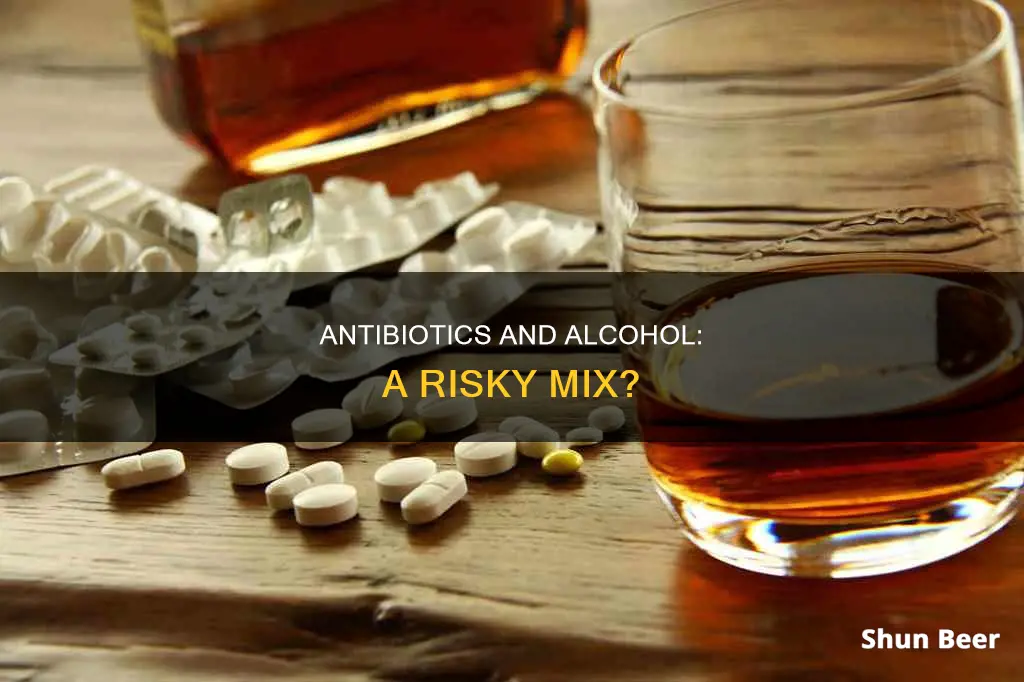
Antibiotics are powerful medications used to treat bacterial infections. While it may be generally safe to consume alcohol in moderation when taking antibiotics, it is important to exercise caution as there can be harmful interactions and negative effects on the immune system. Alcohol can also increase the likelihood of experiencing side effects from antibiotics, such as nausea, dizziness, drowsiness, and digestive issues. Certain antibiotics, such as metronidazole and tinidazole, are known to have severe reactions when mixed with alcohol, and should be completely avoided. It is always advisable to consult a healthcare professional when in doubt about mixing alcohol and antibiotics.
| Characteristics | Values |
|---|---|
| Should you drink alcohol while taking antibiotics? | No, alcohol should be avoided while taking antibiotics. |
| Why? | Alcohol and antibiotics have similar side effects, including stomach upset, dizziness and drowsiness. The risk of experiencing these side effects increases when consuming both. |
| Are there any antibiotics that should never be mixed with alcohol? | Metronidazole, tinidazole, sulfamethoxazole, trimethoprim, and linezolid. |
| What are the side effects of drinking alcohol while taking antibiotics? | Flushing, headache, nausea, vomiting, increased heart rate, altered mental status, fever, lowered effectiveness of the antibiotic, dehydration, weakened immune system, interrupted sleep, etc. |
| What should you do if you're unsure? | Consult your doctor or pharmacist. |
What You'll Learn

Side effects of drinking beer with antibiotics
Drinking beer with antibiotics is not recommended due to the potential for harmful interactions and negative effects on the immune system. While moderate alcohol consumption may not reduce the effectiveness of most antibiotics, it can increase the likelihood and severity of certain side effects.
Increased Side Effects
Consuming alcohol while taking antibiotics can intensify common side effects associated with these medications, such as drowsiness, dizziness, digestive issues, upset stomach, nausea, and diarrhea. These side effects can range from mild to life-threatening, depending on the individual and the amount of alcohol consumed.
Negative Impact on Recovery
Drinking beer with antibiotics can hinder the recovery process by interfering with essential aspects of healing, such as sleep and hydration. Alcohol can disrupt sleep patterns, preventing you from getting the rest needed to recover from an illness or infection. Additionally, dehydration caused by alcohol consumption can further compromise your body's ability to heal.
Altered Mental Status and Elevated Blood Pressure
The combination of alcohol and certain antibiotics, such as linezolid (ZYVOX®), can lead to an altered mental status and a substantial increase in blood pressure, especially when consumed with red wine or tap beer.
Liver and Kidney Damage
Both alcohol and antibiotics are metabolized by the liver, and consuming excessive amounts of alcohol while taking antibiotics may increase the risk of liver and/or kidney damage. Some antibiotics, such as metronidazole (Flagyl) and tinidazole (Tindamax), are known to cause severe reactions when mixed with alcohol, including flushing, headache, nausea, vomiting, and increased heart rate.
Interference with Antibiotic Absorption
Alcohol can interfere with the absorption of some antibiotics, such as doxycycline, making them less effective in fighting infections.
Central Nervous System (CNS) Side Effects
Alcohol and some antibiotics, such as metronidazole (Flagyl), can have additive Central Nervous System (CNS) depressant effects, impacting cognitive function, concentration, and coordination.
In summary, drinking beer with antibiotics is generally not advised due to the potential for negative side effects and interference with the healing process. It is important to follow the instructions provided by your healthcare provider and refer to the warning labels on your medication to ensure safe consumption.
Beer and Amnesteem: Is It Safe to Drink Alcohol?
You may want to see also

How antibiotics and alcohol are metabolised
How Alcohol is Metabolised
Alcohol is eliminated from the body by various metabolic mechanisms. The primary enzymes involved are aldehyde dehydrogenase (ALDH), alcohol dehydrogenase (ADH), cytochrome P450 (CYP2E1), and catalase.
Once alcohol is swallowed, a small amount is absorbed directly by the tongue and mucosal lining of the mouth. The majority of alcohol is then absorbed into the bloodstream through the tissue lining of the stomach and small intestine. Once in the bloodstream, alcohol is carried to all organs of the body.
The liver is the primary organ responsible for the detoxification of alcohol. Liver cells produce the enzyme alcohol dehydrogenase, which breaks alcohol into ketones at a rate of about 0.015 g/100mL/hour.
How Antibiotics are Metabolised
Antibiotics target energy-consuming processes and, as such, perturbations to bacterial metabolic homeostasis are significant consequences of treatment. The metabolic state of bacteria significantly contributes to the efficacy of antibiotics.
The metabolic state of bacteria is closely related to their environment, including nutrients. Therefore, the addition of exogenous compounds to alter the metabolic state of bacteria might recover their sensitivity to antibiotics.
Amino acids, tricarboxylic acid (TCA) cycle metabolites, and nucleotides effectively activate bacterial metabolism and convert tolerant cells to sensitive cells, eventually restoring antibiotic efficacy.
How Alcohol and Antibiotics are Metabolised Together
Mixing alcohol and antibiotics may cause side effects like liver problems or a "disulfiram-like reaction". Alcohol can also affect how some antibiotics are metabolised in the body for elimination. This could lower the effectiveness of the antibiotic or increase its toxicity.
Beer and Orphenadrine: Is It Safe to Drink?
You may want to see also

The impact of alcohol on the immune system
Alcohol has a negative impact on the immune system, which is designed to fight off infections, diseases, and toxins. Drinking can weaken the immune system, leaving us vulnerable to infections and diseases.
The immune system is made up of two parts: the innate immune system, which provides general immunity by responding to viruses, bacteria, and other microorganisms that can cause disease; and the adaptive immune system, which looks after immune memory, including remembering previous infections and stopping them from happening again. Drinking negatively impacts both parts of the immune system.
Short-term effects of alcohol on the immune system include suppressing it for up to 24 hours after consuming 5-6 drinks in a single session. Long-term effects include longer-lasting symptoms and the immune system having to work harder to fight off infections.
Alcohol can also impact the lungs, damaging the immune cells that protect them and reducing the ability of the cells within the airways to remove mucus. This can lead to a weakening of lung function over time, making individuals more vulnerable to serious conditions like pneumonia.
Additionally, alcohol can affect the gastrointestinal tract by reducing the number and variety of 'good' bacteria, which are necessary for a healthy immune function. Alcohol also impacts the cells that make up the lining of the gastrointestinal tract, which is linked to the development of alcoholic liver disease.
Overall, alcohol consumption can increase the risk of adverse health outcomes by compromising the body's immune system. It is recommended to drink in moderation or not at all to reduce the negative impacts on the immune system.
Beer and Miscarriage: Can Drinking Cause Heavy Vaginal Bleeding?
You may want to see also

Antibiotics and alcohol: safe combinations
Mixing antibiotics and alcohol can increase your chance of developing side effects. While it is unlikely that drinking alcohol in moderation will cause problems if you're taking most common antibiotics, certain antibiotics require you to refrain from drinking alcohol altogether.
Side effects
Consuming alcohol while taking antibiotics can cause a variety of minor side effects, including drowsiness, dizziness, digestive issues, nausea, and vomiting. These side effects are common to both alcohol and antibiotics, and the risk of experiencing them increases when both are consumed.
Alcohol's effect on antibiotic efficacy
Alcohol can interfere with your body's ability to absorb some antibiotics, making them less effective. It can also affect how some antibiotics are metabolised in the body for elimination, which could lower the effectiveness of the antibiotic or increase its toxicity.
Alcohol's effect on recovery
Drinking alcohol can lead to dehydration, upset stomach, interrupt normal sleep, and lower your immune response, hindering your body's natural ability to heal itself. It can also disrupt your sleep patterns, increase your blood sugar levels, and zap your energy levels, reducing your body's ability to heal from an infection.
Antibiotics that should not be mixed with alcohol
The following antibiotics should not be mixed with alcohol:
- Metronidazole
- Tinidazole
- Cefoperazone
- Cefotetan
- Ketoconazole
- Isoniazid
- Linezolid
- Doxycycline
- Erythromycin
Precautions
If you are taking antibiotics and are unsure whether it is safe to consume alcohol, always check with your doctor or pharmacist. It is also important to check the labels of other medications, foods, and products such as mouthwash to ensure they do not contain alcohol.
Beer and Kidney Cysts: What's Safe to Drink?
You may want to see also

When to drink beer after a course of antibiotics
For some antibiotics, you may need to wait 48 to 72 hours after finishing your course before drinking alcohol. For example, after taking metronidazole, it's recommended to wait at least 48 hours, and after taking tinidazole, 72 hours. In some cases, such as with linezolid, it may be best to avoid undistilled (fermented) alcoholic drinks like wine, beer, sherry, and lager altogether.
In general, it's a good idea to avoid drinking alcohol when taking medication or feeling unwell. Alcohol can dehydrate you, upset your stomach, interrupt normal sleep, and lower your immune response, hindering your body's natural ability to heal itself. It can also affect how some antibiotics are metabolized in the body, potentially lowering their effectiveness or increasing their toxicity.
However, for most common antibiotics, drinking alcohol in moderation is unlikely to cause problems. Alcohol in moderation is typically defined as one drink for women and two drinks for men.
Beer and Steroid Shots: What's the Verdict?
You may want to see also
Frequently asked questions
It is not recommended to drink beer or any other form of alcohol while taking antibiotics due to the potential for harmful interactions and negative effects on the immune system.
Alcohol can increase the intensity of common antibiotic side effects such as nausea, drowsiness, dizziness, and digestive issues. It can also negatively impact your immune system and slow down the healing process.
It is generally advised to avoid alcohol when taking antibiotics. However, some sources suggest that drinking beer in moderation is unlikely to cause harm when taking penicillins and tetracyclines.
If you drink beer while taking antibiotics, you may experience a range of minor side effects such as increased drowsiness, dizziness, and digestive issues. The specific effects will depend on the type of antibiotic, the amount of alcohol consumed, and the reason for prescribing.
It is recommended to wait until you have completed your course of antibiotics and have fully recovered before consuming alcohol. For some antibiotics, you may need to wait 48-72 hours after finishing your course. Always refer to the warning label and instructions on the packaging, and consult your doctor or pharmacist if unsure.







